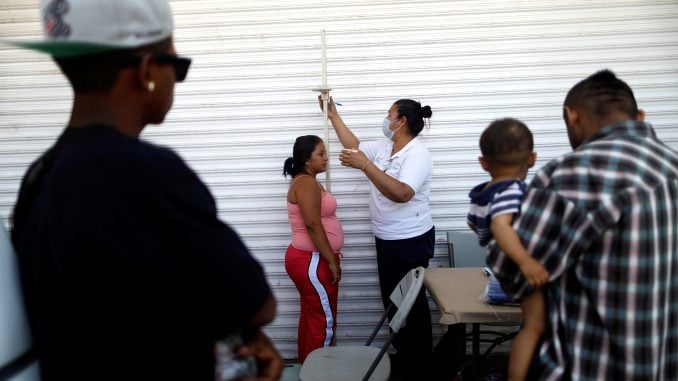
TIJUANA, Mexico — Hundreds of Central American migrants from a caravan that crossed Mexico reunited in Tijuana on Wednesday and planned to cross the border together this weekend in defiance of threats by U.S. President Donald Trump to repel them.
The timing of the migrants arrival could compromise a flurry of talks this week to renegotiate the North American Free Trade Agreement (NAFTA), which Trump has repeatedly threatened to scrap if Mexico does not crack down on the flow of Central Americans through its territory.
U.S. Secretary of Homeland Security Kirstjen Nielsen said her agency was monitoring the caravan and would prosecute anyone who illegally entered the United States or made “a false immigration claim.”
Busloads of migrants began arriving on Tuesday at a shelter that was a five minute-walk from the border and within sight of a U.S. flag waving under an overpass connecting the two countries.
While many rested in tents after a month-long journey across Mexico, others wandered up to the border to contemplate the next stage in their journey.
“The wall doesn’t look that tall,” said Kimberly George, a 15-year-old girl from Honduras as she looked toward a stunted barrier a few feet away. “I really want to cross it.”
Migrants said they fled their homes in Guatemala, El Salvador and Honduras because of death threats from local gangs, the murder of family members or political persecution.
Moving from town to town, the migrant caravan became a stumbling block for U.S.-Mexico relations after Trump unleashed a series of tweets in early April, telling Mexican authorities to stop them.

More busloads of migrants arrived during the course of the day, overflowing the first shelter. Local migrant aid groups said it was the biggest single group they had seen arrive together as they scrambled to find places in ten shelters.
“Thanks to God we’re here,” said 34-year-old Aide Hernandez from Guatemala who had four children in tow. She said she planned to seek asylum in the United State. When asked why, she looked down, ashamed to detail a case of domestic abuse.
Volunteers from U.S.-based advocacy group Pueblos Sin Fronteras, which organized the caravan, addressed the migrants to discuss a plan to cross together the main pedestrian bridge into the United States on Sunday.
Tensions flared after a Mexican immigration official suggested they go in smaller groups to the border station.
Some 2,300 miles across the United States in Washington, D.C., Mexican Foreign Minister Luis Videgaray met with Homeland Security chief Nielsen to discuss Central American migration, the Mexican ministry said in a statement.
Videgaray told Nielsen that Mexico would make its own “sovereign” decisions on immigration and that its cooperation with the United States was dictated by Mexican interests.
Nielson put out her message on the caravan later, making no mention of the talks with Videgaray.
“Individuals of the ‘caravan’ seeking asylum or other similar claims should seek protections in the first safe country they enter, including Mexico,” her statement said, while also stressing that people who “coach” migrants to make false claims could be prosecuted.
“The smugglers, traffickers and criminals understand our legal loopholes better than Congress and are effectively exploiting them to their advantage,” she said.
It was unclear if concerns about immigration could affect the talks. On Monday, Trump threatened to make immigration controls a condition in the NAFTA talks and demanded that Mexico stop people from crossing its territory to enter the United States.




